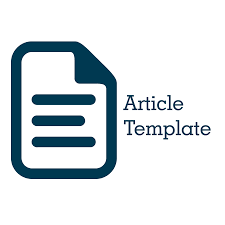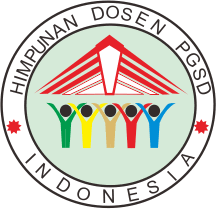Profil buku "Lihat Sekitar" kelas IV ditinjau dari Representasi kecerdasan verbal linguistik dan logis matematis
Abstract
Textbooks are elements of the curriculum that function as learning resources for students, while for teachers, textbooks function to assist the implementation of learning. The purpose of this research is to identify and explain verbal-linguistic intelligence and logical-mathematical intelligence in student textbooks for grade IV Bahasa Indonesia Kurikulum Merdeka. This research is qualitative research using literature study, document study, and note-taking techniques. The validity of the data obtained was tested through source triangulation in the form of a teacher's handbook and through increased persistence. The data obtained were then analysed using the Miles and Huberman interactive model. The results of the study are presented in tabular form and described using descriptions to show representations of verbal-linguistic intelligence and logical-mathematical intelligence. The results showed that writing skills were dominantly developed in activities in students' textbooks while listening skills were still low. Meanwhile, student activity in textbooks shows a dominant representation of verbal-linguistic intelligence compared to logical-mathematical intelligence.
Keywords
Full Text:
PDFReferences
[1] V. M. Cantika 2022 Inovasi Kurikulum Jurnal UPI 19(1) 171–184
[2] A. Arfah 2021 Nadiem: PJJ Ciptakan Learning Loss Terbesar dalam Sejarah RI Detik.com
[3] A. Widiyono and I. Millati 2021 Peran Teknologi Pendidikan dalam Perspektif Merdeka Belajar di Era 4.0 Journal Education Teacher 2(1)1–9
[4] E. Sukmanasa, W. S. Anwar, and L. Novita 2016 Penerapan Keterampilan Abad 21 di Kelas V Sekolah Dasar Jurnal Pendidikan Dasar 11(1) 1-6
[5] Hermansyah 2020 Pembelajaran IPA Berbasis STEM Berbantuan ICT Jurnal Ilmu Profesi Pendidik 5(1) 129–132
[6] P. Priyambodo 2020 Inovasi Pembelajaran Berbasis Teori Kecerdasan Majemuk untuk Pengembangan Peran Sekolah di Era 4.0 Humanika 19(2) 139–156
[7] N. Yusra and R. Vebrianto 2019 Pembinaan dan Pengembangan Kompetensi Generik Calon Guru Bagi Meningkatnya Daya Saing Berbasis Multiple Intelligences Theory (MIT) AL-USWAH Jurnal Riset dan Kajian Pendidikan Agama Islam 1(2) 112–128
[8] R. A. Hidayah 2015 Pengembangan Multiple Intelligences Melalui Pembelajaran Kreatif di Rumah Kreatif Wadas Kelir (RKWK) Kelurahan Karangklesem RT 07/05 Kecamatan Purwokerto Selatan Kabupaten Banyumas Jurnal Penelitian Agama 16(2) 267–282
[9] S. Suhirman 2018 Pengelolaan Sumber Belajar dalam Meningkatkan Pemahaman Peserta Didik Al Fitrah Journal of Early Childhood Islamic Education 2(1) 159
[10] H. Ngulumiyah 2014 Analisis Kesalahan Berbahasa Indonesia pada Buku Teks Pendidikan Kewarganegaraan Kelas III SMP dan Sekenaro Pembelajarannya di SMK Surya Bahtera 2(16) 138–153
[11] R. P. Suci, Chumdari, and I. R. W. Atmojo 2023 Analisis Kesalahan Penggunaan Ejaan Bahasa Indonesia pada Karangan Deskripsi Peserta Didik Kelas IV Sekolah Dasar Jurnal Pendidikan Indonesia 9(449) 1–7
[12] A.E. Rakhmawati, M.R. Mubarok, and D.I. Setiabudi 2022 Analisis Kecerdasan Majemuk pada Buku Ajar Siswa Kelas III Kurikulum 2013 Jurnal Riset Sosial Humaniora, dan Pendidikan 1(1) 1–10
[13] E. L. F. Ahsani 2020 Analisis Bahan Ajar Kurikulum 2013 Berbasis Multiple Intelligence Kelas IV Elementary Islamic Teacher Journal 8(1) 19
[14] J. Ahmad 2018 Desain Penelitian Analisis Isi (Content Analysis) Jurnal Analisis Isi 5(9) 1–20
[15] A. M. T. Putri, S.Y. Slamet, and J.I.S. Poerwanti 2023 Analisis Kesalahan Morfologi Bahasa Indonesia dalam Karangan Narasi Peserta Didik Kelas V Sekolah Dasar Jurnal Pendidikan Indonesia 9(449) 1–6
Refbacks
- There are currently no refbacks.



